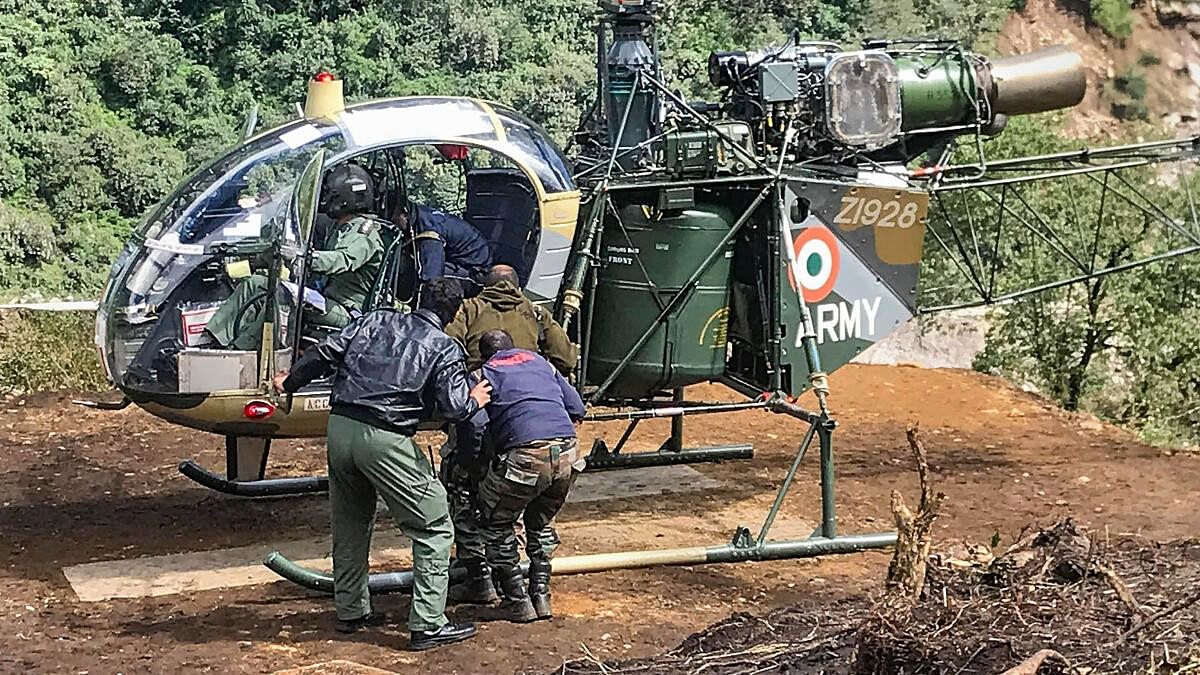
Army personnel rescue civilians from a flood-affected area in North Sikkim.
Credit: PTI Photo
Kolkata: The Indian Army and the Border Roads Organisation (BRO) with the assistance of the civil administration are working on a war footing to restore road connectivity between Mangan and Chungthang in north Sikkim, which suffered extensive damage in recent flash floods, a Defence official said on Sunday.
The Army with the help of the locals and civil administration on Sunday completed construction of a bailey bridge over Teesta River, a crucial requirement for an alternate route between the two places in North Sikkim, he said.
"Troops of Indian Army along with BRO and assistance of civil administration and locals are undertaking operations at a massive scale to reconnect North Sikkim," the official said in a statement.
He said that while BRO is trying to reconnect the main route connecting Mangan, Tung and Chungthang, the Army along with BRO and the assistance of locals and civil administration is making efforts to open up the alternate route between the two places along Mangan, Sanklang, Theng and Chungthang.
Mangan town, the headquarters of Mangan district, is situated 66 kms north of the state capital Gangtok.
Stating that this requires construction of two bailey bridges over the Teesta river at Mangan-Sanklang crossing, the official said that the first bridge was completed on Sunday as a result of round-the-clock work.
Several areas of north Sikkim ahead of Mangan have remained cut off since October 4, when a cloud burst over Lhonak Lake led to flash floods in the Teesta in the strategically important small Himalayan state that shares borders with China, Bhutan and Nepal.
The official said that the gushing water of the Teesta on October 4 increased the width of the river to 600 feet at Mangan-Sanklang crossing and water is now running along two channels with a 160-feet island in between there.
"Decision was therefore taken to construct two bridges. Working on a war footing, the Army finished construction of the 150-foot-long first bridge on Sunday, while the second bridge is likely to be completed by October 27" he said.
Footbridges and zip lines were constructed at Chungthang and Sanklang-Mangan crossing soon enough to enable movement of people on foot and provision of relief material through the zip lines was also established.
A zip line is a cable or rope stretched between two points of different heights, down which a person or materials can slide with the help of a suspended harness, pulley or handle.
The official said that due to large-scale damage to the main road between Mangan-Tung-Chungthang, fresh alignment of the road through Naga village is being made before the damaged bridge site at Toong can be approached and a new bridge is being constructed at the site, which he said 'will take time.'
As an immediate effort to provide an alternative road link to restore connectivity up to Chungthang via Mangan-Sanklang- Theng-Chungthang, troops of Trishakti Corps are undertaking construction of a bailey bridge at Mangan-Sanklang crossing, 200 metres upstream of where a bamboo bridge and zip line was constructed earlier, he said.
Over two weeks after parts of Sikkim were devastated by the flash floods, the damaged National Highway 10 was opened for one-way movement for four-wheelers on Saturday.
People now can use NH-10, considered the lifeline for the state, to drive between Sikkim's capital Gangtok and Siliguri in West Bengal for 12 hours from 6 am.
The flash flood in the Teesta river that hit the Himalayan state in the wee hours of October 4 left at least 78 people dead in Sikkim and neighbouring northern West Bengal.